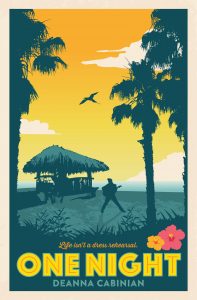How to Prepare for a TED-style Author Talk in Less Than 10 days
By Deanna Cabinian | May 14, 2017 |

Photo by Tormod Ulsberg, Flickr’s CC
Please welcome Deanna Cabinian as our guest today. Deanna is a marketing director who lives in the Midwest, but dreams of living by the ocean. When she isn’t working or writing she enjoys traveling and spending time with her husband and their Havanese dog, Cuba. One Night, her debut YA novel, is out now.
Giving author talks is important not only in terms of promoting books, but also good life experience to have. As an author I figure any experience that pushes me out of my comfort zone a bit is potentially good fodder for my novels.
Connect with Deanna on her blog, on Facebook, and on Twitter.
How to Prepare for a TED-style Author Talk in Less Than 10 days
When an event organizer contacted me to fill in for a last-minute cancellation who was supposed to give a TED-style author talk as part of a weeklong writing festival at a local high school I panicked. There was no way I could pull off a talk like that in less than 10 days. That was the sort of thing that took months to prepare for, possibly a year. I was worried because this would be the largest crowd I’d ever addressed. There would be at least 200 people in attendance but there could be up to 500. Plus I had to be onstage for 35-40 minutes. Since the crowd would be made up of high school students the odds were good that I’d connect with some of my target audience there: teens who love John Green novels. Even though the thought of this speaking opportunity scared me, I knew in my heart that I had to do it. What I did to pull it off and how you can, too:
Watch other TED talks for inspiration. Understand your talk probably won’t leave people with as big of a “wow” feeling due to the time crunch you’re under, however, make a note of which talks capture your attention and why. Try to bring some of that X factor to your own presentation. The talks I gravitated toward included some very personal stories so I knew I had to include some in my own talk.
Make a quick list of all the possible story lines you can tell about yourself as a writer. Keep each story to one sentence/phrase. My ideas were:
- I am old enough to have paper and email rejections
- I started writing women’s fiction but was supposed to be writing YA
- I’ve met a few bestsellers—some randomly, some on purpose
- I quit writing at least 10 times
- I struggle to call myself a writer and share my work
- I know the journey is unpredictable but worth it in the end
I decided to go with a combination of the last two ideas because they were the most upbeat and inspirational. It also had a natural narrative arc.
 Once you decide on your idea, figure out how to make it visual. Audiences remember speeches better if there are visuals involved. Studies have shown that people process images 60,000x faster than text. Since this was a personal journey story I decided to include a lot of photos: myself at five years-old since that’s when I started writing; my senior yearbook photo to represent the time I started writing my first novel; images of my college newspaper where I worked as an editor. During my speech I also talked about sources of inspiration and showed pictures of my dog, Cuba. I could see smiles form on attendees’ faces as that slide went up. Images are great in terms of jogging your own memory, too, and reminding you what you need to be speaking about at a given moment.
Once you decide on your idea, figure out how to make it visual. Audiences remember speeches better if there are visuals involved. Studies have shown that people process images 60,000x faster than text. Since this was a personal journey story I decided to include a lot of photos: myself at five years-old since that’s when I started writing; my senior yearbook photo to represent the time I started writing my first novel; images of my college newspaper where I worked as an editor. During my speech I also talked about sources of inspiration and showed pictures of my dog, Cuba. I could see smiles form on attendees’ faces as that slide went up. Images are great in terms of jogging your own memory, too, and reminding you what you need to be speaking about at a given moment.
Do not write a script for your speech. Jot down notes and phrases but don’t try to plan for everything that will be said. The best talks allow for some ad-libbing. Plus if you write a script for yourself you will stumble if you don’t remember to say something exactly as you wrote it. I took an executive speaking course last year for work and saw this happen time and again. Someone tried to remember a script they had written instead of having a more natural conversation with the audience.
Don’t make it a sales pitch. Talks like these should be managed like your social media accounts. Be helpful. Be yourself. Be genuine. Tell the audience what makes your personal story unique. Tell them what obstacles you encountered. If there are logical places to mention your book by all means try to work it in. I mentioned my novel, One Night, when I got to the sources of inspiration section of my talk (One Night is set in Hawaii and I shared some of my favorite Hawaii vacation photos). But don’t make it a blatant “buy my book” pitch.
Practice as much as time allows. Ideally you should run through your talk at least three times if possible. Time yourself to make sure it fits within the time frame you’re given. If you mess up during practice, just keep going. Pretend it’s the actual day of the talk where you won’t be able to have a redo. If possible practice in front of someone, or at the very least, your dog.
Wear something that makes you feel like a million bucks. Whether that is a red dress, a suit, or a leather jacket. Wear something that instills confidence and makes you feel like you’ve earned the right to be up on stage. If you hear a Beyoncé song in your head when you put on an outfit that’s the outfit you should wear.
I was a nervous wreck before my big talk, going so far as to Google “author visits gone wrong,” but in the end it went well. I had a lot of fun doing it. The audience was engaged and students asked thoughtful questions. Afterward, a few students came up to me to commend me on my performance. One girl said, “You know, we’ve had a lot of boring speakers come and talk to us, but you were actually interesting.” Her compliment made my day.
What advice do you have when it comes to preparing for author talks? What was your most memorable presentation experience (good or bad)? Share in the comments!









Lots of good advice. Here’s one more tip from Toastmasters:
Practice plenty, yes. But especially, practice the first line every chance you get, until you know that when you get to the mic you cannot POSSIBLY freeze up for even an instant. Once you’ve made that start, the momentum of your planning and practice can carry you through the rest.
I agree, that’s terribly important. Because that awful feeling of freezing up will catch you exactly where it hurts the most: at your throat!
One more piece of advice: don’t prepare your speech in long form but instead jot down the main points on a single sheet of paper and in bold, large letters so you can read it at a distance! Again, if you freeze, or suddenly don’t remember where you are, what your next point is, it will be immensely useful!
Great advice all around!
With the release of my debut YA novel two years ago, I needed to be able to handle both prepared and impromptu speaking engagements. The latter were especially trying for me. I joined a local Toastmasters (there were scores to choose from) and have found it surprisingly helpful, fun and fulfilling. We meet for an hour every week but it’s fine to miss weeks. Public speaking anxiety levels have at least declined if not disappeared. I recommend it for all authors.
I have one piece of advice you’d think is so obvious it’s not worth mentioning…and yet it doesn’t seem to occur to so many speakers: “Stick to the topics that interest your audience. Don’t waste their time on ramblings that are interesting only to you.”
I’ve sat through too many conference presentations, panels, and workshops in which the speakers droned on and on about their pet research projects, their life stories, their hobbies or their politics. Some were vain and believed the audience had come to their talks because they were such fascinating and impressive specimens of humanity, not because the topics listed in the program were relevant to their careers. Some were simply oblivious and really thought their adventures in experimental piano playing were super interesting.
When I make presentations or give demos, I always ask the organizer (or the teacher, if it’s a class) about the makeup of the audience and what they need or want to learn. If the organizer gives an unhelpful response, I ask the audience themselves.
This is how I started my last talk at a conference on technology in libraries. “So how many of you are librarians? Wow, that’s a lot of hands. Any web developers in the room? Not too many…but I expect there are a lot more of you hiding, because web developers don’t raise their hands in public. All right, so since we’re mostly librarians, I’ll zip through the programming part of this project so you don’t get bored to tears. Then I’ll talk about what this application does and how it might be useful to you at your libraries, with twenty minutes for questions at the end. Sound good?”
T.K. – this is probably the best advice out there. I have heard many speeches that gave little regard to what the audience might be interested in. It’s always good to find out what the crowd wants and/or needs to hear and tailor your speech to that.
Gee, there are some great tips here today. Perfect timing for me since I have a book event and signing in June (Massachusetts) for my novel Greylock. The audience will be Herman Melville fans and tourists/climbers on Mt. Greylock. Thank you all for the targeted advice!
Know what your conclusion will be, so you end strong instead of drifting off into vagueness.
Agreed! A strong finish leaves a better impression than drifting off.